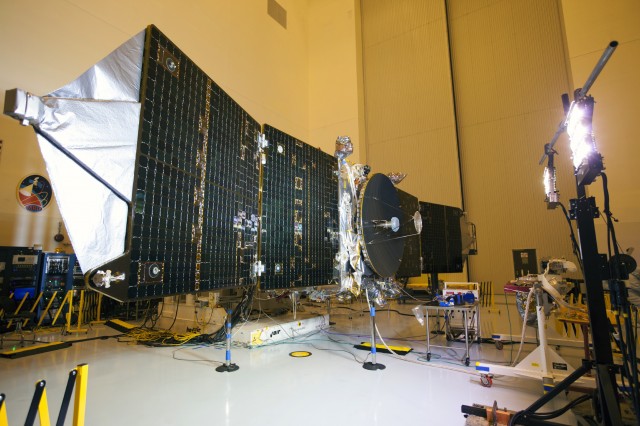Key role as communications hub keeps probe on schedule.
by John Timmer

by John Timmer

MAVEN shows off some of its communications hardware while on the ground.
With the US government shut down, many areas of science are suffering. If things like clinical trials and energy research are considered nonessential, then a mission to study the climate of Mars seemingly wouldn't have a chance. Yet all indications show that the MAVEN launch will go off in November as planned, whether the government is back up and running or not. The key factor seems to be that delays could cause problems for other hardware already on Mars and end up costing more than is saved.
MAVEN is the Mars Atmosphere and Volatile Evolution Mission, and its scientific goal is to track the dynamics of Mars' atmosphere as it interacts with both sunlight and the solar wind. It's hoped that the study of the current interplay will give us a greater understanding of how Mars has evolved since the days when the planet had an atmosphere thick with greenhouse gasses, enabling it to maintain significant amounts of liquid water on its surface.
But not all of MAVEN's hardware is scientific; it's also designed to serve as a communication hub, relaying data from the rovers on Mars' surface (currently Curiosity and Opportunity). Right now that role is played by Mars Odyssey and the Mars Reconnaissance Orbiter. But both of them have been in operation for years (Mars Odyssey is a dozen years old, MRO eight years). Maven will not only provide us with new communications hardware in orbit at Mars, it is also the only mission planned to carry this sort of equipment on the books.
Any delay past the launch window's close in early December means a longer trip to Mars and more fuel to get there. As a result, MAVEN's science lead has announced that NASA has determined its launch warrants an exception under the law that identifies emergency spending. Work has already restarted to prepare the orbiter for launch.
Courtesy: arstechnica



0 comments:
Post a Comment